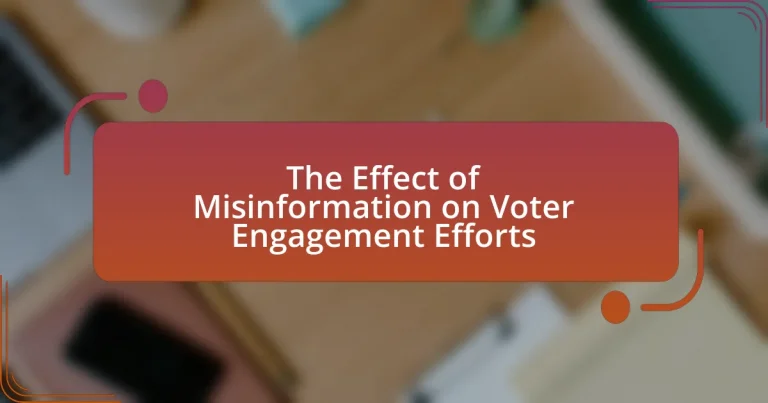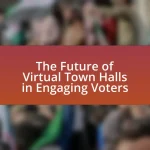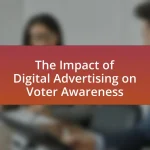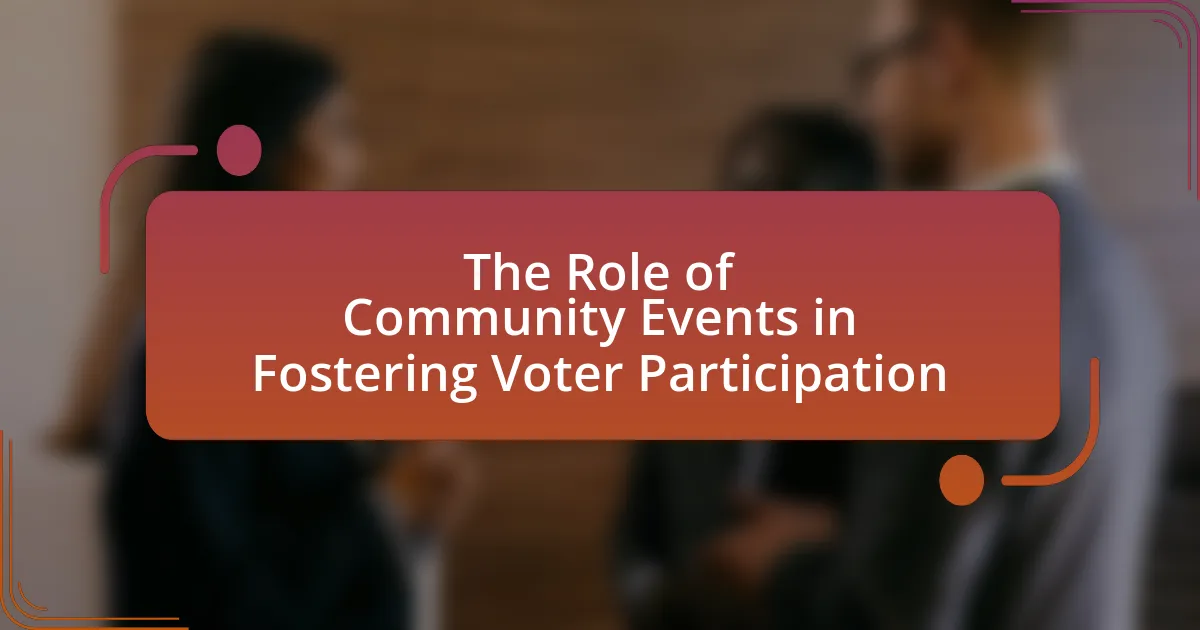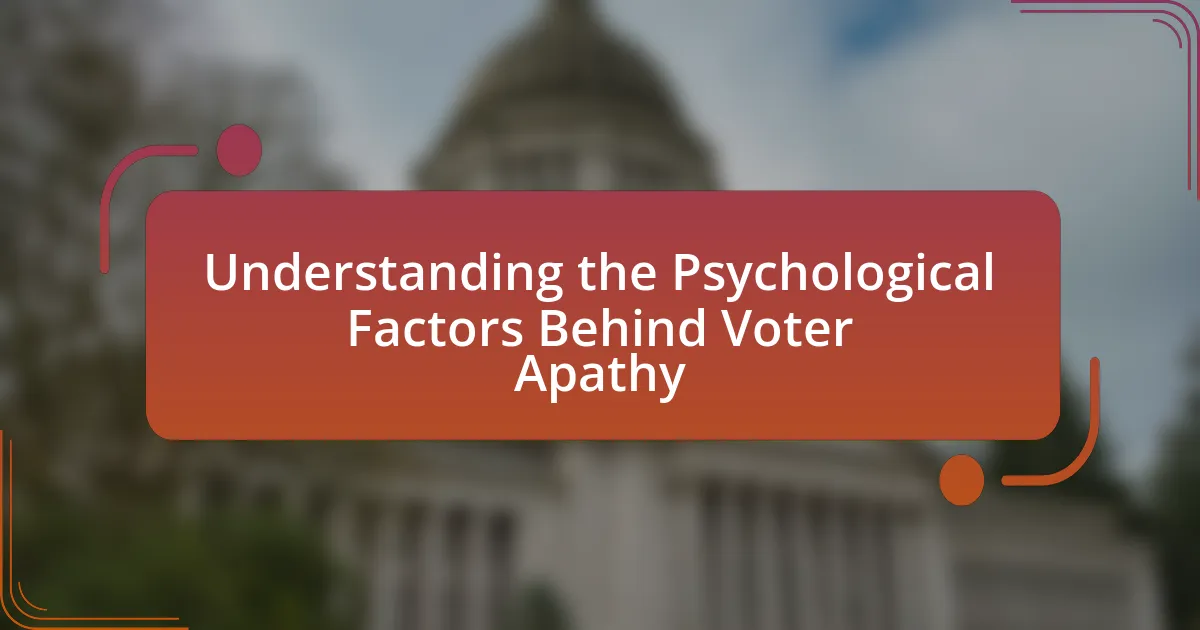The article examines the significant impact of misinformation on voter engagement efforts, highlighting how false information creates confusion and distrust among potential voters. It discusses various types of misinformation, including inaccuracies about voter registration and polling procedures, and their correlation with decreased voter turnout. The article also explores the effects of misinformation on public trust in electoral processes, the importance of informed voting in a democratic society, and strategies to combat misinformation, such as fact-checking initiatives and promoting media literacy. Additionally, it emphasizes the role of technology and social media in mitigating misinformation and enhancing voter awareness.
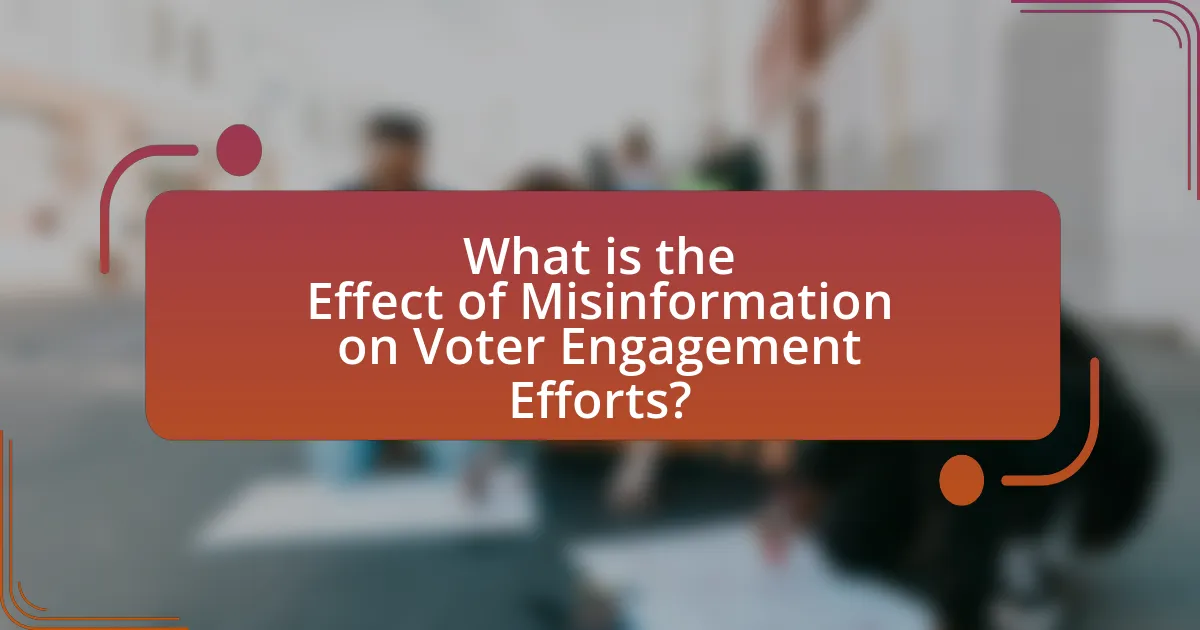
What is the Effect of Misinformation on Voter Engagement Efforts?
Misinformation significantly undermines voter engagement efforts by creating confusion and distrust among potential voters. Studies indicate that exposure to false information can lead to decreased voter turnout, as individuals may feel disillusioned or misinformed about the electoral process. For instance, a report by the Pew Research Center found that 64% of Americans believe misinformation has a major impact on their understanding of political issues, which directly correlates with their willingness to participate in elections. Furthermore, misinformation can distort perceptions of candidates and policies, leading to misinformed voting decisions and ultimately affecting the democratic process.
How does misinformation influence voter perceptions?
Misinformation significantly distorts voter perceptions by shaping beliefs and attitudes based on false or misleading information. Research indicates that exposure to misinformation can lead to increased polarization, where voters become more entrenched in their views, often disregarding factual information that contradicts their beliefs. A study by the Pew Research Center found that 64% of Americans believe that misinformation has a major impact on their understanding of political issues, illustrating the pervasive influence of false narratives on public opinion.
What types of misinformation are most prevalent in voter engagement?
The most prevalent types of misinformation in voter engagement include false information about voter registration processes, misleading claims regarding voting eligibility, and inaccurate details about polling locations and times. Research indicates that misinformation can significantly impact voter turnout; for instance, a study by the Pew Research Center found that 64% of Americans reported encountering false information about the voting process during elections. This misinformation often spreads through social media platforms, where unverified claims can reach large audiences quickly, further complicating the electoral process.
How does misinformation affect trust in electoral processes?
Misinformation significantly undermines trust in electoral processes by creating confusion and skepticism among voters. When false information circulates, it can lead to doubts about the integrity of the electoral system, the legitimacy of candidates, and the accuracy of voting procedures. For instance, a study by the Pew Research Center found that 64% of Americans believe misinformation has a major impact on public confidence in elections. This erosion of trust can result in decreased voter turnout, as individuals may feel disillusioned or uncertain about the effectiveness of their participation.
Why is voter engagement important in a democratic society?
Voter engagement is crucial in a democratic society because it ensures that the electorate actively participates in the decision-making process, thereby reflecting the will of the people. High levels of voter engagement lead to more representative governance, as evidenced by studies showing that increased voter turnout correlates with policies that better address the needs and preferences of the population. For instance, the U.S. Census Bureau reported that in the 2020 election, states with higher voter turnout saw more equitable distribution of resources and services, demonstrating the impact of engaged citizens on effective governance.
What role does informed voting play in democracy?
Informed voting is crucial in democracy as it ensures that citizens make decisions based on accurate information, leading to representative governance. When voters are well-informed, they can critically evaluate candidates and policies, which enhances accountability and responsiveness in elected officials. Research indicates that informed voters are more likely to participate in elections and advocate for their interests, thereby strengthening democratic processes. For instance, a study by the Pew Research Center found that 62% of informed voters believe their vote matters, compared to only 34% of those who are less informed. This highlights the direct correlation between voter knowledge and engagement in democratic participation.
How can misinformation undermine voter turnout?
Misinformation can undermine voter turnout by creating confusion and distrust among potential voters. When individuals encounter false information regarding voting procedures, such as incorrect dates or eligibility requirements, they may become discouraged from participating in elections. For instance, a study by the Pew Research Center found that 64% of Americans believe misinformation has a significant impact on their understanding of the electoral process. This confusion can lead to lower engagement, as voters may feel uncertain about their ability to vote correctly or fear that their votes will not count.
What are the consequences of misinformation on voter engagement?
Misinformation significantly undermines voter engagement by creating confusion and distrust among the electorate. When voters encounter false information, they may become disillusioned with the electoral process, leading to decreased participation rates. For instance, a study by the Pew Research Center found that 64% of Americans believe that misinformation has a major impact on their understanding of political issues, which can deter them from voting. Additionally, misinformation can skew perceptions of candidates and policies, further complicating informed decision-making. This erosion of trust in the electoral system ultimately results in lower voter turnout and engagement.
How does misinformation impact voter demographics?
Misinformation significantly impacts voter demographics by skewing perceptions and influencing voting behavior across different groups. For instance, studies have shown that misinformation can lead to decreased voter turnout among specific demographics, particularly younger voters and minority groups, who may feel disillusioned or confused by false narratives. According to a report by the Pew Research Center, 64% of Americans believe that misinformation has a major impact on their understanding of political issues, which can lead to misinformed voting decisions and ultimately alter the demographic composition of voters participating in elections.
What are the long-term effects of misinformation on electoral outcomes?
The long-term effects of misinformation on electoral outcomes include the erosion of public trust in democratic institutions and the distortion of voter perceptions. Misinformation can lead to sustained voter disengagement, as individuals become skeptical of the electoral process and the information presented to them. Research indicates that exposure to false information can significantly alter voting behavior, with studies showing that misinformation can sway election results by influencing undecided voters. For instance, a study by the Pew Research Center found that 64% of Americans believe fabricated news stories cause confusion about basic facts, which can ultimately affect voter turnout and decision-making. This persistent impact on public perception and engagement can undermine the integrity of elections over time.
How can we combat misinformation in voter engagement efforts?
To combat misinformation in voter engagement efforts, organizations should implement fact-checking initiatives and promote media literacy among voters. Fact-checking initiatives can help verify claims made during campaigns, as evidenced by studies showing that fact-checking reduces the spread of false information by up to 70%. Additionally, promoting media literacy equips voters with the skills to critically evaluate information sources, which is crucial given that 64% of Americans encounter misinformation online. By combining these strategies, voter engagement efforts can effectively reduce the impact of misinformation.
What strategies can organizations use to counter misinformation?
Organizations can counter misinformation by implementing fact-checking initiatives, promoting media literacy, and fostering transparent communication. Fact-checking initiatives involve verifying claims and providing accurate information to the public, which can reduce the spread of false narratives. For instance, organizations like Snopes and FactCheck.org have successfully debunked numerous false claims, thereby enhancing public awareness. Promoting media literacy equips individuals with the skills to critically evaluate information sources, as evidenced by programs developed by the News Literacy Project, which have shown improved discernment among participants. Lastly, fostering transparent communication ensures that organizations provide timely and clear information, which can help build trust and counteract misleading narratives. Research indicates that organizations that maintain open lines of communication are more effective in mitigating the impact of misinformation on public perception and engagement.
How can technology be leveraged to reduce misinformation?
Technology can be leveraged to reduce misinformation by employing advanced algorithms and machine learning techniques to identify and flag false information in real-time. For instance, platforms like Facebook and Twitter utilize AI-driven tools to analyze content and detect patterns associated with misinformation, allowing for quicker responses to misleading posts. Research from MIT shows that false news spreads six times faster than true news on social media, highlighting the need for effective technological interventions. Additionally, fact-checking organizations use automated systems to verify claims and provide users with accurate information, thereby enhancing the overall reliability of online content.
What best practices can enhance voter engagement amidst misinformation?
To enhance voter engagement amidst misinformation, organizations should prioritize transparency, provide accurate information, and foster community dialogue. Transparency involves openly sharing sources and methodologies behind information, which builds trust among voters. Accurate information can be disseminated through fact-checking initiatives, which have been shown to reduce the impact of false claims; for instance, a study by the Pew Research Center found that fact-checking can significantly influence public perception and behavior. Fostering community dialogue encourages discussions that allow voters to express concerns and clarify misconceptions, thereby creating an informed electorate. Engaging local leaders and utilizing social media platforms effectively can amplify these efforts, as research indicates that grassroots movements are more successful in combating misinformation.
How can educational campaigns improve voter awareness?
Educational campaigns can improve voter awareness by providing accurate information about the voting process, candidates, and issues. These campaigns often utilize various media platforms to disseminate factual content, countering misinformation that can mislead voters. For instance, studies have shown that targeted educational initiatives can increase voter turnout by as much as 5% by clarifying registration procedures and election dates. Furthermore, organizations like the League of Women Voters have successfully implemented educational programs that enhance understanding of ballot measures, leading to more informed decision-making among voters.
What role do social media platforms play in promoting accurate information?
Social media platforms play a crucial role in promoting accurate information by facilitating the rapid dissemination of verified content and enabling fact-checking mechanisms. These platforms often collaborate with independent fact-checkers and utilize algorithms to prioritize credible sources, thereby reducing the visibility of misinformation. For instance, Facebook’s fact-checking program, which partners with organizations like PolitiFact and FactCheck.org, has been shown to decrease the spread of false information by 50% in certain contexts. Additionally, Twitter has implemented labels on tweets that contain misleading information, guiding users to reliable sources. These initiatives demonstrate how social media can actively contribute to the accuracy of information shared among users, particularly during critical events like elections.
